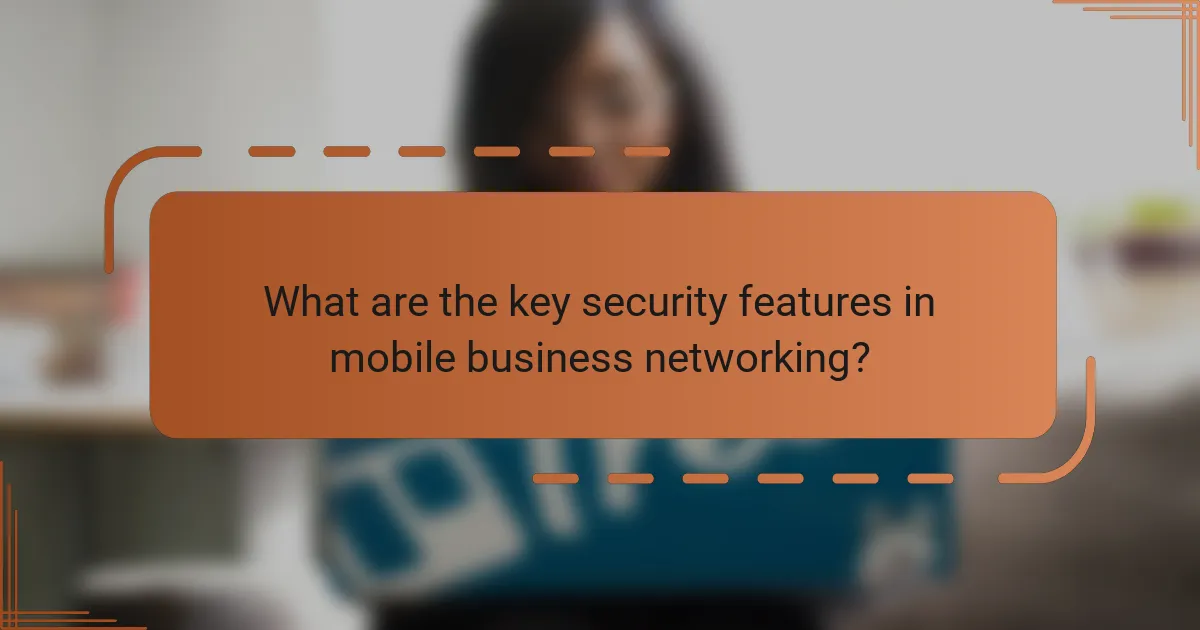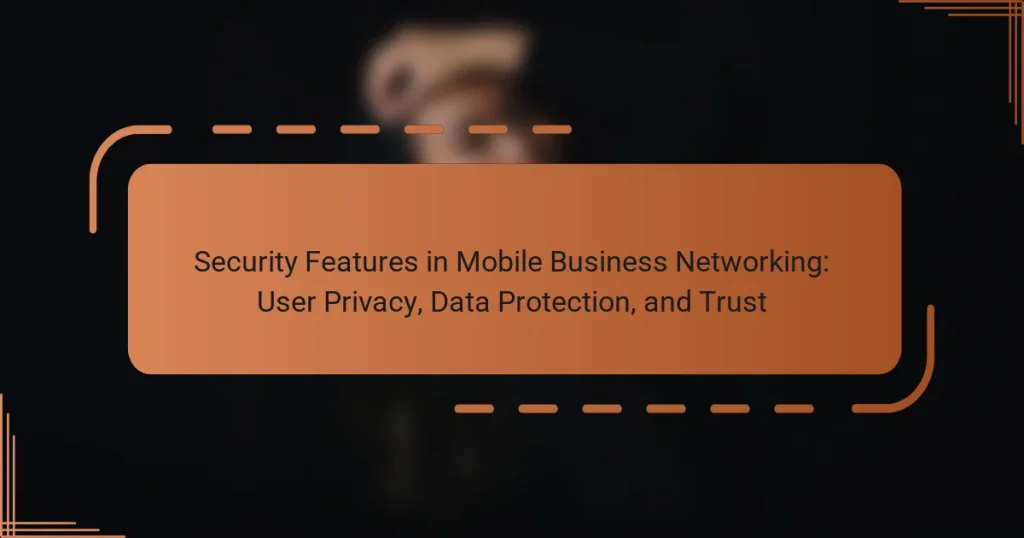Security features in mobile business networking are critical for protecting user privacy, ensuring data protection, and maintaining trust. Key components include encryption, which secures data during transmission and storage; authentication, which verifies user and device identities; and secure access controls, which manage user permissions based on roles. These features collectively enhance data integrity and safeguard sensitive information. A study by Verizon highlights that 81% of data breaches stem from stolen or weak credentials, underscoring the necessity for robust authentication measures. Overall, these security protocols are essential for fostering a secure mobile business networking environment.

What are the key security features in mobile business networking?
Key security features in mobile business networking include encryption, authentication, and secure access controls. Encryption protects data during transmission and storage. It ensures that sensitive information remains confidential. Authentication verifies the identity of users and devices before granting access. Secure access controls limit user permissions based on roles. These features work together to safeguard user privacy and data integrity. According to a study by Verizon, 81% of data breaches involve stolen or weak credentials, highlighting the importance of strong authentication. Overall, these security measures are essential for maintaining trust in mobile business networking environments.
How do these security features enhance user privacy?
Security features enhance user privacy by implementing encryption, authentication, and access controls. Encryption protects data by converting it into a coded format. This ensures that only authorized users can access the information. Authentication verifies the identity of users before granting access to sensitive data. Access controls limit who can view or modify data, reducing the risk of unauthorized access. According to a study by the International Data Corporation, organizations that implement robust security measures can reduce data breaches by up to 60%. These features collectively create a secure environment that fosters user trust and safeguards personal information.
What specific technologies are used to protect user privacy?
Encryption is a primary technology used to protect user privacy. It secures data by converting it into a coded format that only authorized users can access. This technology is widely implemented in messaging apps, email services, and file storage solutions. Virtual Private Networks (VPNs) also enhance privacy by masking users’ IP addresses and encrypting internet traffic. Another technology is two-factor authentication (2FA), which adds an extra layer of security by requiring users to verify their identity through a second device. Secure Sockets Layer (SSL) certificates are essential for protecting data transmitted over the internet. They establish an encrypted link between a web server and a browser. Privacy-focused browsers and search engines further protect user data by limiting tracking and data collection. These technologies collectively contribute to safeguarding user privacy in various digital environments.
How do encryption methods contribute to user privacy in mobile networking?
Encryption methods enhance user privacy in mobile networking by securing data transmissions. They protect sensitive information from unauthorized access during communication. Encryption algorithms, such as AES (Advanced Encryption Standard), convert readable data into an unreadable format. Only authorized users with the correct decryption key can access the original data. This process prevents eavesdropping and data interception by malicious actors. According to a 2020 study by the International Journal of Information Security, encryption significantly reduces the risk of data breaches in mobile networks. Secure protocols like HTTPS and VPNs utilize encryption to safeguard user privacy. Overall, encryption is essential for maintaining confidentiality and trust in mobile networking.
What role does data protection play in mobile business networking?
Data protection is crucial in mobile business networking as it safeguards sensitive information from unauthorized access. This protection ensures that personal and corporate data remains confidential. With the rise of mobile connectivity, the risk of data breaches has increased significantly. According to a report by IBM, the average cost of a data breach in 2021 was $4.24 million. Effective data protection measures help mitigate these risks. They include encryption, secure access controls, and regular security audits. These strategies build trust between businesses and their clients. Trust is essential for successful mobile business networking.
What are the common threats to data protection in mobile environments?
Common threats to data protection in mobile environments include malware, phishing attacks, and insecure Wi-Fi networks. Malware can infect mobile devices through malicious applications, compromising sensitive data. Phishing attacks often target users via email or SMS, tricking them into revealing personal information. Insecure Wi-Fi networks expose devices to eavesdropping and data interception. Additionally, lost or stolen devices can lead to unauthorized access to confidential information. According to a report by Symantec, 54% of mobile users experienced a phishing attempt in 2020. These threats highlight the need for robust security measures in mobile business networking.
How can businesses implement effective data protection strategies?
Businesses can implement effective data protection strategies by adopting a multi-layered approach. This includes encryption of sensitive data both at rest and in transit. Implementing strong access controls ensures that only authorized personnel can access critical information. Regular security audits help identify vulnerabilities in the system. Employee training on data protection policies is essential for maintaining awareness. Compliance with regulations such as GDPR and CCPA reinforces legal obligations. Utilizing secure cloud services can enhance data security measures. Monitoring and logging access to data systems provide insights into potential breaches. These strategies collectively improve data security and protect user privacy.
Why is trust crucial in mobile business networking?
Trust is crucial in mobile business networking because it underpins all interactions and transactions. In a mobile environment, users often share sensitive information. Without trust, users are hesitant to engage, fearing data breaches or fraud. Trust enhances collaboration and fosters long-term relationships. According to a study by the Ponemon Institute, 60% of consumers are more likely to engage with businesses they trust. This statistic shows that trust directly influences user engagement and business success. Thus, establishing trust is essential for effective mobile networking.
What factors influence user trust in mobile networking solutions?
User trust in mobile networking solutions is influenced by several key factors. Security features play a crucial role in establishing trust. Robust encryption methods protect user data from unauthorized access. Transparency about data usage and privacy policies enhances user confidence. User experience, including ease of use and reliability, also impacts trust levels. Regular updates and maintenance show commitment to security. Reputation and user reviews further shape perceptions of trustworthiness. Compliance with regulations, such as GDPR, reinforces user assurance. Collectively, these factors contribute to a trustworthy mobile networking environment.
How can businesses build and maintain trust with their users?
Businesses can build and maintain trust with their users by ensuring transparency and security. Transparency involves clear communication about data usage and policies. Users appreciate knowing how their information is handled. Implementing robust security measures protects user data from breaches. Regular security audits and updates reinforce a commitment to safety. Providing users with control over their data enhances trust. Features like opt-in consent and easy data access are essential. Positive user feedback and testimonials contribute to credibility. According to a 2021 study by the Ponemon Institute, organizations with strong data protection practices experience higher user trust levels.
How do security features impact user experience in mobile business networking?
Security features significantly enhance user experience in mobile business networking by providing protection and fostering trust. Strong encryption safeguards sensitive data during transmission. This reduces the risk of data breaches and unauthorized access. Additionally, multi-factor authentication adds an extra layer of security. It ensures that only authorized users can access business networks.
When users feel secure, they are more likely to engage actively in networking activities. According to a 2021 report by Cybersecurity Insiders, 80% of users prioritize security when using mobile applications for business. This highlights the direct correlation between security features and user satisfaction.
Moreover, clear privacy policies and transparent security measures contribute to user confidence. Users are more inclined to share information when they understand how it will be protected. Therefore, robust security features not only protect data but also enhance the overall user experience in mobile business networking.
What are the trade-offs between security and usability?
The trade-offs between security and usability often manifest in conflicting design choices. High security measures can hinder user experience, making systems complex and difficult to navigate. For example, multi-factor authentication enhances security but can frustrate users due to additional steps. Conversely, prioritizing usability may lead to weaker security protocols, exposing systems to risks. A study by the National Institute of Standards and Technology indicated that overly simplistic security can result in increased vulnerabilities. Therefore, achieving a balance between robust security and user-friendly design is crucial for effective mobile business networking.
What best practices should businesses follow for security in mobile networking?
Businesses should implement strong authentication methods for mobile networking security. Multi-factor authentication enhances access control. Regularly updating software and applications minimizes vulnerabilities. Encrypting sensitive data protects it during transmission. Establishing a mobile device management policy ensures compliance and security. Training employees on security awareness reduces human error risks. Monitoring network traffic can detect and respond to threats promptly. Conducting regular security audits identifies weaknesses in the mobile network. These practices collectively enhance overall security in mobile networking.
The main entity of the article is security features in mobile business networking, which are essential for ensuring user privacy, data protection, and trust. Key topics include the importance of encryption, authentication, and secure access controls in safeguarding sensitive information and user data. The article also explores how these security measures enhance user privacy, the technologies employed to protect data, and the common threats faced in mobile environments. Additionally, it discusses the significance of trust in mobile networking and best practices for businesses to implement effective security strategies. Overall, the article provides a comprehensive overview of how security features impact user experience and the balance between security and usability.


